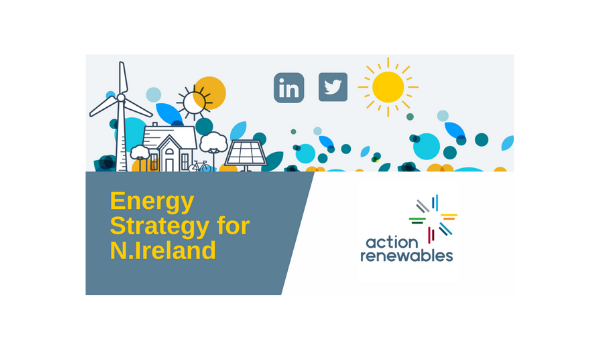DfE Energy Strategy – The future of Renewables in Northern Ireland

The eagerly awaited Energy Strategy for Northern Ireland was published by DfE (Department for the Economy) on 16th December 2021, much to the relief and anticipation of the entire renewables industry.
Moving to a greener industry, business and personal lifestyle is certainly a growing trend in 2022, with more pressure being put on Government institutions to adapt a greener economy with the aim of becoming net-zero by 2050…its only 28 years away!
So, let’s break this down and take a closer look at the Action Plan and the key points the consumers of Northern Ireland can take away and explore further.
For this strategy and action plan, the government departments have focused on potential energy schemes involving the deployment of onshore wind and solar, producing a Hydrogen centre of excellence and expanding the growth of anaerobic digestion with injection into the national gas grid.
On-shore wind and solar are proven technologies on the scale of renewables in Northern Ireland, and with the closure of the current NIRO (Northern Ireland Renewables Obligation) scheme in March 2017, the interest to deploy a further energy scheme has only grown. DfE have committed to consulting on another energy scheme in 2022, with the potential delivery in 2023 that will allow consumers to deploy wind and domestic solar technologies.
Hydrogen is the must abundant gas in Earth’s atmosphere, the DfE City Deals Team have committed to developing a business case which would see the delivery of a Hydrogen Centre of Excellence located at the Advanced Manufacturing Innovation Centre (AMIC). With the hopes of understanding the opportunities, needs and economic growth capabilities of harnessing Hydrogen as a renewable fuel.
Anaerobic Digestion is already a proven fuel alongside wind and solar. DAERA (Department for Agriculture, Environment and Rural Affairs) will consider the future of anaerobic digestion and producing the gas in a whole system approach. Alongside these considerations, discussion around gas grid injection and the economic benefits will also come in to play. With many AD operators availing of the RTFO (Road Transport Fuel Obligation) scheme since its inception in 2007.
With the ban on new petrol and diesel cars being brought forward to Government from 2040 to 2030, DfI (Department for Infrastructure) are committed to publishing an EV (Electric Vehicle) infrastructure action plan which will be completed by a designated taskforce.
The above ambitions only begin to scratch the surface on what the renewables industry in Northern Ireland needs to do to meet the net-zero carbon targets by 2050. The goal should be to incentivise the public in utilising renewable energy sources in their homes and businesses, making it clean accessible and affordable for everyone.
We have quite a distance to travel before reaching our targets for carbon emissions, but with the right direction and legislation put in place to expand on the already proven technologies and schemes and the investment in further opportunities, we will create and sustain a future for renewables and the Northern Ireland Economy.
For more information on the DfE Energy Strategy and the action plan, you can access all the information you need at the link below. Our excellent staff here at Action Renewables are always available to manage any enquiries you may have, feel free to contact the team on 028 9072 7760.



